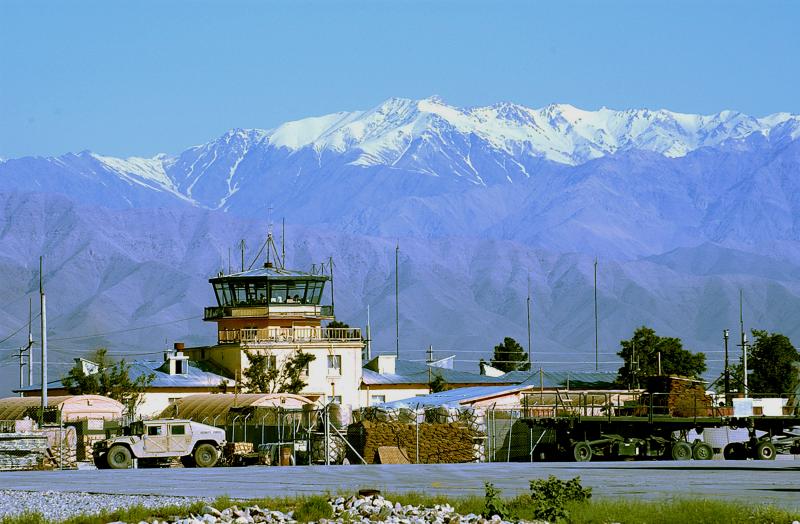In 329 B.C., the Western world’s first excursion into Afghanistan culminated in the founding of a city just north of modern day Kabul. On the way to India, Alexander the Great stationed 3,000 of his veterans to settle there, in the foothills of the Hindu Kush mountains. Located at a crossroads that remains important today, the city’s ruins lie underneath Bagram Air Base – the centre of operations for U.S. and NATO forces in Afghanistan for the past 20 years. Over the years, this mini-city grew in size to span 30 square miles during the U.S. and NATO missions, reaching a peak where it housed tens of thousands of soldiers and came complete with swimming pools and cinemas. Robin Williams, a frequent visitor during U.S.O tours, quipped that it was kind of like Palm Springs, except for the mines and the mortars.
Just a few years after founding the city in 329 B.C., then known as Alexandria in the Caucuses, its namesake – Alexander the Great – was dead, and his empire’s grip on the region was lost. Into the Land of Bones, by Frank L. Holt tells the story of Alexander’s troubles in Afghanistan, drawing parallels with the NATO and U.S. mission there. “The experiences of Alexander the Great, though long ago, still resonate, and they suggest that America’s resolve will be sorely tested in that truculent land.” Mr. Holt published this book just three years into the U.S. and NATO mission in Afghanistan in 2005. The mission continued for 16 years after that and is just now finally coming to a close.
On July 2nd 2021, the last American forces vacated Bagram Air Base in the middle of the night leaving behind some 3.5 million pieces of equipment. The Air Base had long been a powerful symbol of NATO and the U.S. commitment to building a Western-style democracy in Afghanistan. The subsequent looting that followed the hasty and disorganized departure therefore was a poignant and symbolic moment. The Taliban’s advances in the region of late are a tragic, and chilling end to the U.S. and NATO mission in the country. This dynamic is most true for Afghans, whose collective opinion at the moment could be summed up by former Afghan President Hamid Karzai in an interview with the BBC, “NATO failed to defeat terrorism in Afghanistan.”
So, what is next? Having been embroiled in conflict for the past 40 years, early signs of what life might be like in the near future are not promising. The pullback of U.S. and NATO forces has been matched by a proportional rise in Taliban activity and attacks on government forces. As of June 1st, the Taliban control 50-70% of the countryside, and peace talks between them and the government have stalled. Keen to press their advantage on a weakened Afghan state, the Taliban have been increasingly aggressive.
The overall speed at which the Taliban are retaking control of the country is sparking concern in American security circles. As formerly government controlled districts continue to fall, many see a full blown civil war in the near future. Over a thousand Afghan security personnel fled over the border with Tajikistan in the face of a recent Taliban advance. This most recent incident was the result of a poorly equipped, underpaid, and demoralized Afghan force, facing a motivated attack by the Taliban: emblematic of the situation throughout the country. While Afghan special forces have proved effective time and again versus Taliban insurgents, there are not enough of them to turn the tide. To Afghani civilians, the government seems impotent and unable to provide them with any sense of security. Furthermore, the government has proven mostly incapable of delivering basic services expected of them due to corruption and a lack of dependable institutions.
Despite the Taliban’s recent advances, retaking the major cities from the government will be a tall order. As such, a war of attrition is in the making. Both sides stand to lose much in the fighting to come, and for civilians caught in the middle, the 40 years of largely uninterrupted conflict seem destined to continue into the foreseeable future.
For NATO and the U.S., what can be taken as an outcome of the past 20 years? The U.S. has spent more on Afghanistan than was spent on the Marshall Plan to rebuild Europe. According to iCasualties, 3,577 coalition service members have been killed in the country since 2001. At the onset of NATO’s involvement in the country, Afghanistan was billed as an opportunity for rebirth for the alliance – giving it a new purpose in a post USSR-world. 20 years on, is NATO stronger now than it was before?
In NATO’s Strategy 2030, Afghanistan is only mentioned explicitly six times. The report displays a significant shift away from counter-insurgency, and towards “competing great powers.” It also demonstrates a suspicion at efforts to export democracy and democratic values to war torn and previously undemocratic parts of the world. This acknowledgement is a result of the little impact that billions of dollars have had in Afghanistan since 2001 due to poor planning, limited oversight, and local corruption. From a state-building perspective, NATO and its allies leave Afghanistan with little to show for its effort.
While the lack of success in Afghanistan has left many in NATO countries with a bitter taste in their mouths, the mission has undoubtedly increased interoperability between NATO allies, as well as habits of intelligence sharing. It also provided an opportunity for NATO to work with friendly, non-NATO countries such as Australia and South Korea – especially important considering the region in which those countries sit. Lastly, the simple fact that so many NATO countries in Afghanistan persevered for so long, despite the unpopularity of the conflict at home, does demonstrate the importance these countries place on the alliance. Put by one European official at a 2019 meeting of the NATO Military Committee, “my country had no direct security interest in going to Afghanistan. We did it for [the U.S.]”
When Article 5 of NATO’s founding treaty was invoked after 9/11, NATO allies were called to join the fight in Afghanistan. Billions of dollars, thousands of coalition lives, and 20 years of effort later, it must be acknowledged that the worst effect of the conflict is felt by the local Afghan people. Some think it better to leave the country, evidenced by lengthening queues at the passport office. Understandably, many Afghans are looking for an exit strategy rather than be caught in the middle of a fight between an oppressive Taliban and an ineffectual state.
Either against foreign powers, or against itself, Afghanistan has been in largely uninterrupted conflict for decades. During the Soviet occupation, an estimated 1 million Afghan non-combatants died. Since the U.S. and NATO mission began, conservative estimates put the Afghan civilian death toll at 47,600.
Whether NATO and the U.S. will modify their counter-insurgency tactics as a result of this war remains to be seen. Similarly, only time will tell whether lessons were learned in how to build new, resilient institutions. What should be clear to all by this point however, is that good intentions and high-minded ideals mean nothing without the political will to back them up, the expertise to see them through, and an exit strategy. The lack of the latter was painfully apparent as Bagram Air Base was being looted – as some of the weapons and equipment stolen from the abandoned base will surely find themselves in Taliban hands, and turned on the very government that NATO member states have tried to build for the past 20 years.
Photo: Bagram Control Tower (2004), by J.G. Buzanowski via UPI. Public Domain.
Disclaimer: Any views or opinions expressed in articles are solely those of the authors and do not necessarily represent the views of the NATO Association of Canada.



